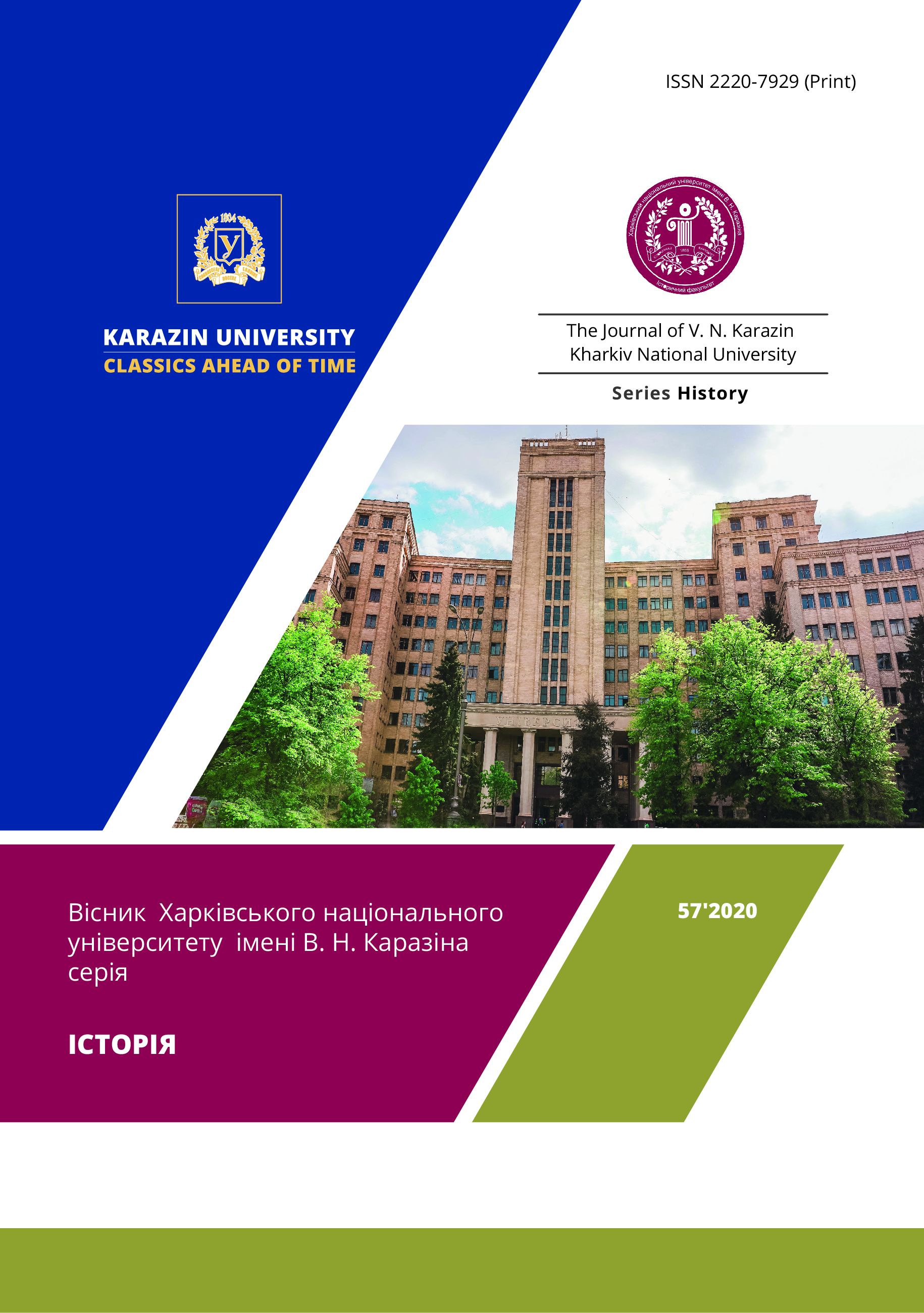The Mental Image of the City in the Worldview of Activists of Dnipro’s Jewish Programs
Abstract
The article analyzes the mental image of the city through the prism of a particular ethnic group’s attitude towards it, throwing light on the key features of the formation of urban public memory in general. The study is part of the research project “CityFace: Practices of the Self-Representation of Multinational Cities in the Industrial and Post-Industrial Era,” which covers five Ukrainian cities. Comparative and hermeneutic analysis, methods of cliometrics, social psychology, and pragmatic and cognitive sociology were employed. Furthermore, in order to create a holistic image of the city of Dnipro, the author drew on J. Vidal’s symbolic anthropology, K. Lynch’s concept of the mental image of the city, P. Nora’s idea of sites of memory, etc. The study centers on the contents of personal questionnaires and oral interviews. The interviews involved the methods of mental maps and social cartography, which made possible a clearer interpretation of the geocultural space of the city in the imagination of respondents through the use of drawings and the mapping of objects. This combination of methods allowed the author to build a hierarchy of the main features of the city as seen by respondents from each age microgroup. The study was carried out in several stages from June to August 2019. 32 respondents aged 20 to 60 participated in the questionnaire and interview phase of the study, performing various types of tasks. In the final phase, analysis of the results allowed the author to reconsider the prevalent idea of Dnipro in current literature, as well as to trace the shifting priorities in determining the most important loci of Dnipro across changing generations. Working with activists of Jewish programs, the author was able to construct a picture of the attitude towards of the city among the members of one of its communities and to pinpoint the group-specific and more general features of their perception of the city. Using Dnipro as a case study, the article observes certain tendencies towards a change in the perception of cities and urban space, as well as outlines some prospects of the further development of metropolitan areas in modern Ukraine.
Downloads
References
Чернова, Л., Шелест, Ю. и Иванникова, О. Образ города глазами жителей. Вісник Придніпровської державної академії будівництва та архітектури, № 3, 2014, с. 64-70. Available at:
Глазков, К. Ментальные карты: способы анализа, погрешность и пространственная метрика. Социология власти, № 3, 2013, с. 39-56. Available at:
Глазков, К. Ментальные карты: ограничение метода и образ «чужого» в малом городе. Laboratorium: Russian Review of Social Research, vol. 7, issue 3, 2015, pp. 106-17.
Голд, Дж. Психология и география. Основы поведенческой географии. Москва, 1990.
Линч, К. Образ города. Москва, 1982.
Милграм, С. Эксперимент в социальной психологии. Санкт-Петербург, 2000.
Mumford, L. The Culture of the Cities. Westport, 1981.
Наумова, Е. Социология «градов» Л. Болтански и Л. Тевено и «режимы вовлеченности» в капитализм. Социологическое обозрение, т. 13, № 3, 2014, c. 246-51.
Орлова, В., Иванова, Е. Ментальные образы города Томска (на примере студентов университета). Вестник Санкт-Петербургского государственного университета, сер. 12, вып. 1, 2014, c. 99-108.
Пирогов, С., Петухов, А. Феноменолого-когнитивная концепция города и её теоретические экстраполяции. Контекст и рефлексия: философия о мире и человеке, т. 6, № 3А, 2017, c. 120-130. Available at:
Soini, K. Exploring Human Dimensions of Multifunctional Landscapes through Mapping and Map-making. Landscape and Urban Planning, no. 57, 2001, pp. 225-39.
Верлен, Б. Общество, действие и пространство. Альтернативная социальная география. Социологическое обозрение, т. 1, № 2, 2001, c. 26-48.
Vidal, J. Sacré, Symbole, Créativité. Louvain-la-Neuve, 1990.
Веселкова, Н. Ментальные карты города: вопросы методологии и практика использования. Социология: методология, методы, математическое моделирование (4М), № 31, 2010, c. 5-29. Available at:
Вильковский, М. Социология архитектуры. Москва, 2010.
Волков, В., Хархордин, О. Теория практик. Санкт-Петербург, 2008.
Wolff, L. A New Mental Map of the World. The New York Times, June 28, 2001, p. 29.
Copyright (c) 2020 Bulanyi M. Yu.

This work is licensed under a Creative Commons Attribution 4.0 International License.
Authors who publish with this journal agree to the following terms:
- Authors retain copyright and grant the journal right of first publication with the work simultaneously licensed under a Creative Commons Attribution License that allows others to share the work with an acknowledgement of the work's authorship and initial publication in this journal.
- Authors are able to enter into separate, additional contractual arrangements for the non-exclusive distribution of the journal's published version of the work (e.g., post it to an institutional repository or publish it in a book), with an acknowledgement of its initial publication in this journal.
- Authors are permitted and encouraged to post their work online (e.g., in institutional repositories or on their website) prior to and during the submission process, as it can lead to productive exchanges, as well as earlier and greater citation of published work (See The Effect of Open Access).




